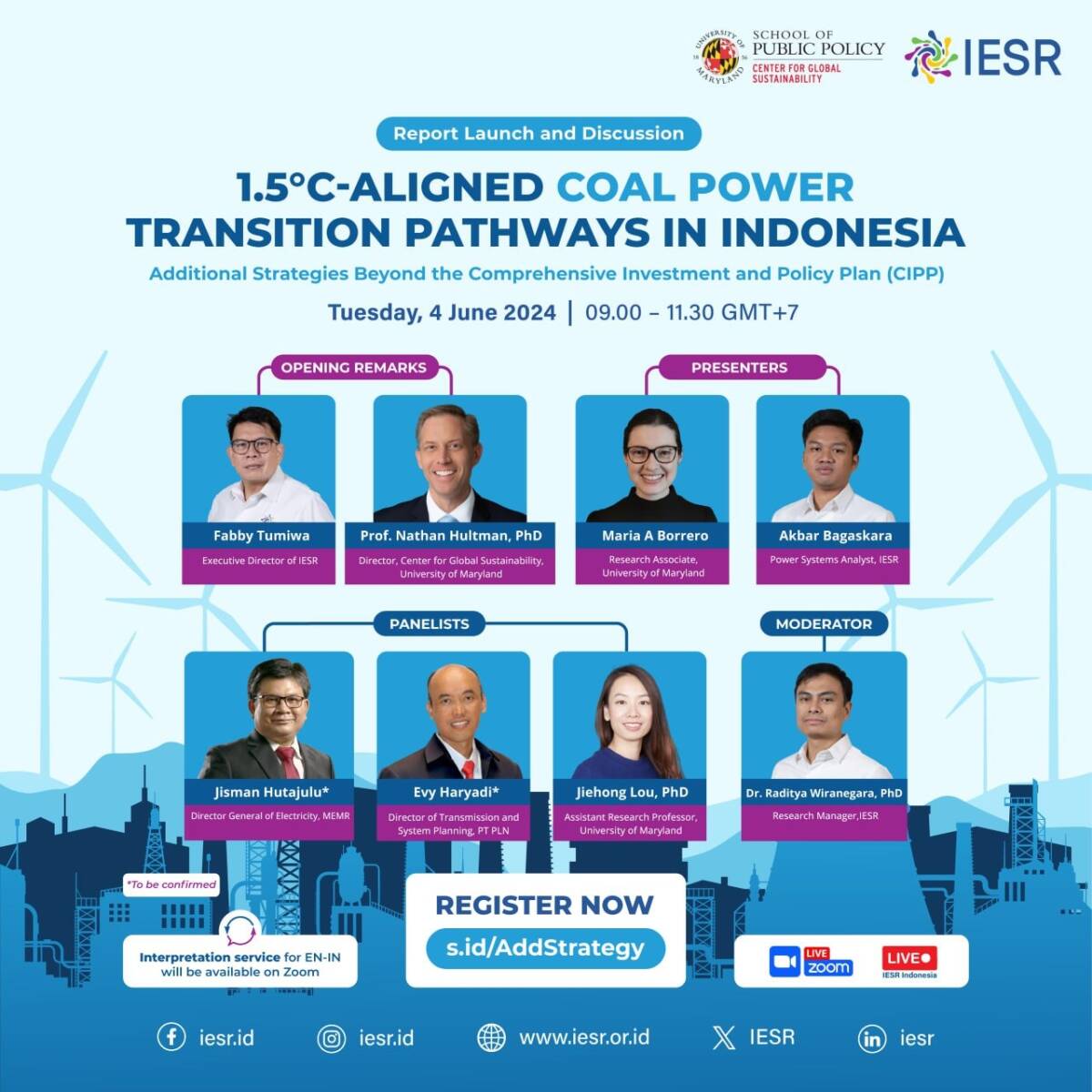
Report Launching and Discussion : 1.5°C-aligned coal power transition pathways in Indonesia: additional strategies beyond the Comprehensive Investment and Policy Plan (CIPP)
Background
Indonesia has ratified the Paris Agreement through Law no 16/2016. As a result, Indonesia is legally bound to contribute to the global struggle to mitigate the climate crisis through ambitious efforts and action in reducing Greenhouse Gas (GHG) emissions and limiting the increase of the average global temperature below 1.5 0C. In one of the IPCC climate model results of a 1.5 0C compatible pathway, the global Greenhouse Gas (GHG) emission must decrease by 45% in 2030 compared to 2010 and reach net zero emission by 2050. As of now, Indonesia is among the top 10 greenhouse gas (GHG) emitters and is still projected to increase its emissions, with the energy sector as the highest GHG contributor by 2030.
In November 2023, the Government of Indonesia published the first version of the Comprehensive Investment and Policy Plan (CIPP), outlining the country’s power sector emissions reduction roadmap and strategies. While the plan was expected to detail how the emissions reduction and renewable targets envisioned by the JETP will be delivered with investment and policies, we find that critical elements of a successful coal power transition are absent from the current version.
According to the CIPP report, the investment required to achieve the 2030 targets proposed in the plan is estimated at 97 US$ billion.8 These resources will cover over 400 priority projects22, including grid development, phase-out of coal power plants, and the deployment of renewable energy. Overall, 50% of the resources are allocated for investment in dispatchable clean technologies such as geothermal and hydropower, while 26% is designated for variable renewable plants, and 20% for transmission infrastructure. The early retirement of coal plants represents just 2% of the entire plan8.
Join the Institute for Essential Services Reform (IESR) and the Center for Global Sustainability (CGS) at the University of Maryland on (insert date) to learn about new research into achieving a successful coal power transition in Indonesia. This event will launch two new reports, followed by a discussion session to disseminate key findings and recommendations to Indonesian stakeholders.
- To address the gaps in investment and subsequent resources, IESR and CGS assessed existing and pipeline coal power plants to determine retirement priority using a muti-criteria framework under a 1.5 0C compatible emission pathway for Indonesia. The research develops a comprehensive, high-ambition pathway for Indonesia’s coal power transition by combining a global integrated assessment model (GCAM), a power system dispatch model (PLEXOS), and bottom-up analyses. It expands the existing version of the CIPP in several dimensions, including (1) assessing the pathway that is 1.5°C aligned through 2050, (2) covering both on-grid plants and off-grid captive plants, (3) exploring a larger set of transition options for different coal plants, and (4) conducting plant-by-plant assessments to better understand the technical and economic suitability for individual plants, using the best available data. Further analysis is done to determine the costs and benefits of the early coal retirement scenario from economic, social, and environmental aspects, for a wider set of stakeholders.
- The Center for Global Sustainability’s new report and database, the first of its kind on industrial parks, which is a pivotal element of the broader CIPP initiative aimed at bolstering regional economies. This launch highlights the importance of enhanced data availability, essential for understanding demand and making informed decisions about captive coal development. It also emphasizes the need to balance environmental objectives with economic growth and explores the potential for developing renewable energy sources within industrial estates.
Objective
The objectives of these seminars and workshops are:
- Disseminate the IESR-UMD study on transition strategies and 1.5°C -aligned pathway for on grid and captive power plants
- Discuss and identify aspects to consider for Indonesia to implement its coal-to-renewables strategy.
- Identify and propose a holistic framework for Indonesia beyond JETP CIPP to assess its transition strategies and 1.5°C -aligned pathway
Presentation
1.5°C-aligned Coal Power Transition Pathways in Indonesia – Akbar Bagaskara & Maria A Borrero
1.5°C-aligned-coal-power-transition-pathways-in-Indonesia-PresentationSustainable Industrial Development in Indonesia Challenges and Opportunities in Industrial Parks – Jiehong Lou
Sustainable-Industrial-Development-in-Indonesia-Challenges-and-Opportunities-in-Industrial-ParksSpeakers
-
Fabby Tumiwa - Chief Executive Officer (CEO) - IESR
-
Maria A Borrero - Research Associate - University of Maryland
-
Jisman Hutajulu - Dirjen Ketenagalistrikan - KESDM
-
Adi Lumakso - Director of Generation Management - PT PLN Persero
-
Dr. Raden Raditya Wiranegara – Manajer Riset IESR
-
Richard N. Flynn - Technical Director - PT Cikarang Listrindo Tbk
-
Jiehong Lou - Assistant Research Professor - UMD

